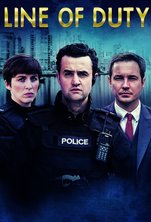
The Regular Character probably needs to be the point of view
I watched the first episode of Series 3 Line of Duty season recently. It's a highly-acclaimed UK police show, for those of you who aren't familiar with it, with a Police Investigator and his team who investigates malpractice in the Force. This episode was interesting technically. To me at least it was weak and the reason, in my view, was that the story was structured around the guest character, not the regular Police Investigative Team. It was the guest character's story, from his point of view, with the investigative team very much in the background, sort of saying 'Hmm ... we know this guy is guilty but how do we prove it...?' from time to time - and doing very little else. Which, actually, made them come over as redundant. In fact, you probably could have removed the team from the episode without losing much at all. The above poster says it all. The investigative team are in the background. Risky.
I realise that the story set up in this episode was part of an ongoing serial line which was going to be pursued in future episodes, but I'd question this approach. It's dangerous territory to assume that the audience will follow through and watch Ep 2 when Ep 1 is weak. It's a big problem when people are writing pilots. It's very easy to write your pilot that sets up really interesting stuff to happen in episode 2. The problem is, if your pilot isn't strong enough, will the audience stick around for episode 2?
Maybe the creators thought the audience was loyal enough to take a weak episode 1. Presumably, they were right, since Line of Duty was commissioned for another season. I saw the first Line of Duty season a couple of years ago. It was indeed structured around the investigator, and it was riveting. I haven't watched Series 2. Watching the show this time... well. It didn't work for me. It just didn't engage. Good acting, good direction. I didn't return to watch the next episode.
Writing from the Regulars' Point of View
This approach - whereby the regular characters are put in the background - is interesting for a discussion about how you construct stories in TV series. Usually, when you write TV dramas series, you write the story from the point of view of the character or characters that the audience is rejoining your series to see, moreover whom they're returning to see acting in character. There's common sense in this approach. The reason your audience is watching is to see, say, a Sherlock Holmes adventure, not some new character doing things, with Sherlock Holmes having next to nothing to do with the story. You sit down to watch Sherlock being Sherlock as he solves crimes in his unique Sherlock way. That's the contract the creators have with the audience.
For those of you wanting to create your own TV series or write for existing TV series, it's really hard at first to drag yourself away from the new character in the series (often because, in existing series, you get to invent it), and put yourself inside the regulars so as to write that story from the regulars' point of view. But I think you have to. You have to honor that audience contract. Otherwise your regulars will be marginalised and the episode, however well you write it, is likely to come over as weak, incomplete.
But it takes a really big mental shift to do it. In Line of Duty, I'd say the audience is not coming to see: 'Fascinatingly Crooked Cop'. They are coming to see 'Investigative team cleverly hunts down Fascinatingly Crooked Cop'. There's a real difference.
Maybe what's happening in Line of Duty here is that the series creators are approaching their series as you would a TV serial. There is an important difference (this may sound dry but it can be the difference between success and failure). The difference is that serials are typically stories about a group, with some characters foregrounded but all of the group important and appearing in all seasons - as for example in Downton Abbey. We care about and know all of them. That makes it much easier to hold the audience when the spotlight is turned on a background character - because the audience is familiar with that character so is predisposed (you hope) to want to know more. However, in a series like a cop show or a medical show where the format is that a group of regular characters solves a crime or deals with patients who are new or little known and then disappear when the story ends (characters who 'walk in the door' as the saying is in the trade), the audience of course can't have that connection and interest in the new character. Yes, the baddie in the Line of Duty ep I watched had, I gather, appeared before. But the focus was so strongly on this baddie that our intrepid team were left with nothing to do and, I have to say, looking a bit inept. And there was also the obligatory scene of one of the regulars' girlfriends turning up irked because he was late or unavailable so as to push the relationship line along. I always think of the actor playing the woman. Same scene each week.
But look, the show got another season, so the audience was happy with it and maybe I'm making a mountain out of a molehill. But I would say the approach is risky. It's not to be done, I'd suggest, unless you are really sure you have a loyal audience - and can one ever be sure of that?
Never to be done as the pilot on a show where the recipe is 'characters walking in the door'. In that instance your pilot should pull out all the stops to get the audience interested in the regulars. They are what your audience will be coming back for.
Anyway, there you go...
 RSS Feed
RSS Feed


